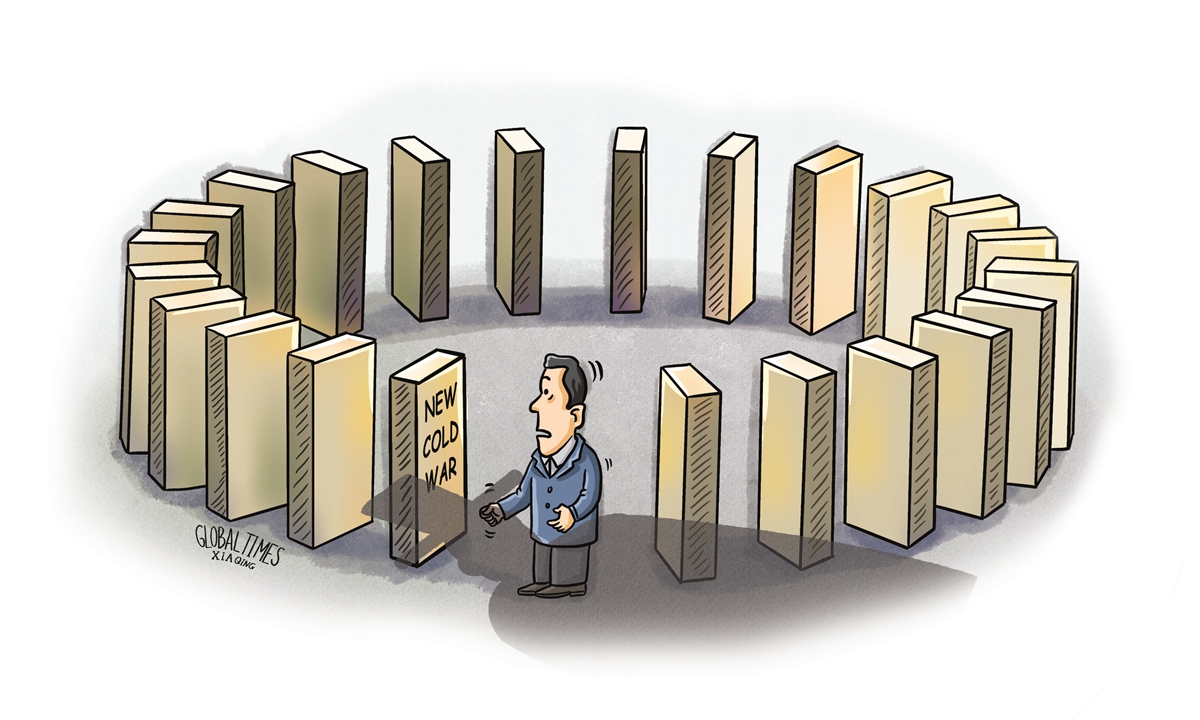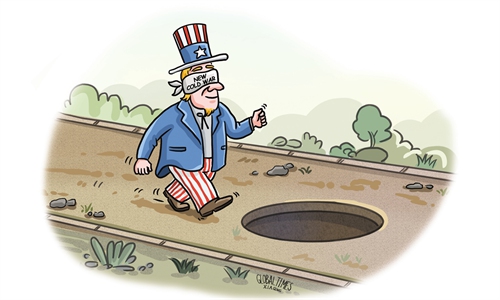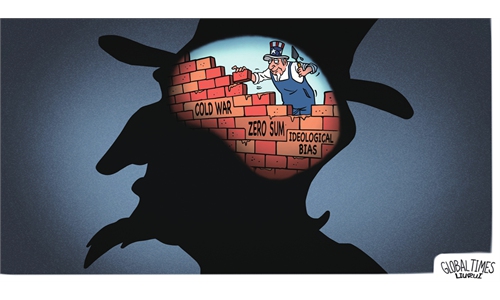
Illustration: Xia Qing/GT
Editor's Note:The China-US bilateral relationship is one of the most important in the world. The trajectory of this relationship has attracted international attention. Still, the US is stepping up its efforts to suppress China on various fronts such as politics and diplomacy, economy, trade, technology, and military security, showing the true meaning of a cold war. The Global Times invites Chinese and foreign experts to expose the US' manipulation of the "new cold war" and reveal the damage it may potentially cause to the world.
This is the fifth installment of the series.
The recent visit of North Korean leader Kim Jong-un to Russia has raised concerns in South Korea, particularly the worry that a new cold war dynamic may be emerging in Northeast Asia, namely the northern triangle of Beijing-Moscow-Pyongyang vs. the southern triangle of Washington-Tokyo-Seoul. The reason why Western media are sparing no effort in hyping up the so-called northern triangle is because the southern triangle is taking shape. Yet it must be pointed out that South Korea still plays a crucial role in preventing the formation of a new cold war in Northeast Asia.
The deconstruction of the Cold War in Northeast Asia is undoubtedly a secondary effect of the end of the Cold War between the US and the Soviet Union. However, South Korea had made significant contributions to this process. For instance, in June 1990, then South Korean President Roh Tae-woo held his first summit with then Soviet leader Mikhail Gorbachev in San Francisco, and diplomatic relations between the two countries officially began on September 30, 1990. In 1992, China and South Korea established diplomatic ties. It was at this time when negotiations were held between South and North Korea, and the Agreement on Reconciliation, Non-Aggression, and Exchanges and Cooperation between South and North Korea, as well as the Joint Declaration of the Denuclearization of the Korean Peninsula were signed.
Since then, the relationship between the two countries has gone through fluctuations with both sides even viewing each other as the "archenemy" at one point. However, South Korea's efforts toward realizing reconciliation with China, Soviet Union and North Korea have contributed to the gradual melting of the Cold War ice in Northeast Asia. These positive changes have been made possible through the joint efforts of China, Soviet Union, and other parties, including the Roh administration's "Northern Diplomacy." Roh laid the foundation for South Korea to enjoy more than 30 years of peace dividends and created conditions for further regional integration in Northeast Asia.
Today, the US is once again sounding the horn of a new cold war on the Eurasian continent, seeking to maintain its hegemonic position through strengthening bilateral alliances and building small cliques. However, whether a new cold war dynamic will reemerge in Northeast Asia, and whether there will be a counterflow against regional integration, is not solely determined by the US. It is also influenced to a considerable extent by the choices made by major regional countries, including South Korea. Unfortunately, the current administration of South Korea seems to be going against the tide of peace. Since coming to power, the Yoon Suk-yeol government has pursued a values-based diplomacy, adopting a so-called "strategic clarity" policy that leans toward the US.
The Yoon government has shown it has no principle when it comes to improving ties with Japan, consolidating alliance with the US, and responding to the trilateral military cooperation with the US and Japan. One of its starting points is the belief that a new cold war between China and the US has already begun, and Yoon administration believes that the US, representing so-called freedom and democracy, is bound to win.
Although the ruling power in South Korea refuses to admit it, opposition forces in South Korea and rational elites have long warned that the emerging signs of a new cold war in Northeast Asia are to a considerable extent the result of Seoul's response to the US' push for the new cold war. However, some ruling elites in South Korea resolutely refuse to acknowledge that they are accomplices in escalating tensions on the Korean Peninsula and instead attempt to use the improved relations between North Korea and Russia as an excuse for their country's accelerating pace down the path of the new cold war paved by the US and Japan.
The new cold war has not yet taken shape in Northeast Asia, the vast majority of the region's population does not want to see it coming either. Judging from various concerns within South Korea, it is not in South Korea's interest to rush to the forefront of confronting China and Russia on behalf of the US, regardless of what kind of subjective intentions and objective reasons. Once a new cold war is ignited in the region, it could not only inflict further damage on South Korea's economy but also potentially drag the country into an avoidable "hot war." At that point, South Korea's destiny will become increasingly beyond its control.
Having gone through the Korean War and the Cold War, the South Korean people understand that a new cold war will only lead to boundless suffering. South Korea should strive for strategic autonomy, work to prevent the emergence of a new cold war in the region, engage and cooperate with China, Russia and North Korea, and avoid following the US and Japan in military and ideological confrontations.
The author is the director and professor of the Center for Korean Peninsula Studies at the Shanghai University of International Business and Economics. opinion@globaltimes.com.cn



